Key takeaways:
- Binge eating triggers often stem from emotional states such as stress, loneliness, and boredom, highlighting the importance of fostering awareness of these influences.
- Practicing mindful eating, through techniques like slowing down, engaging senses, and limiting distractions, can transform eating into a more intentional and satisfying experience.
- Building a support network and practicing self-compassion are crucial for overcoming binge eating, as they provide accountability, understanding, and the ability to learn from setbacks without self-judgment.
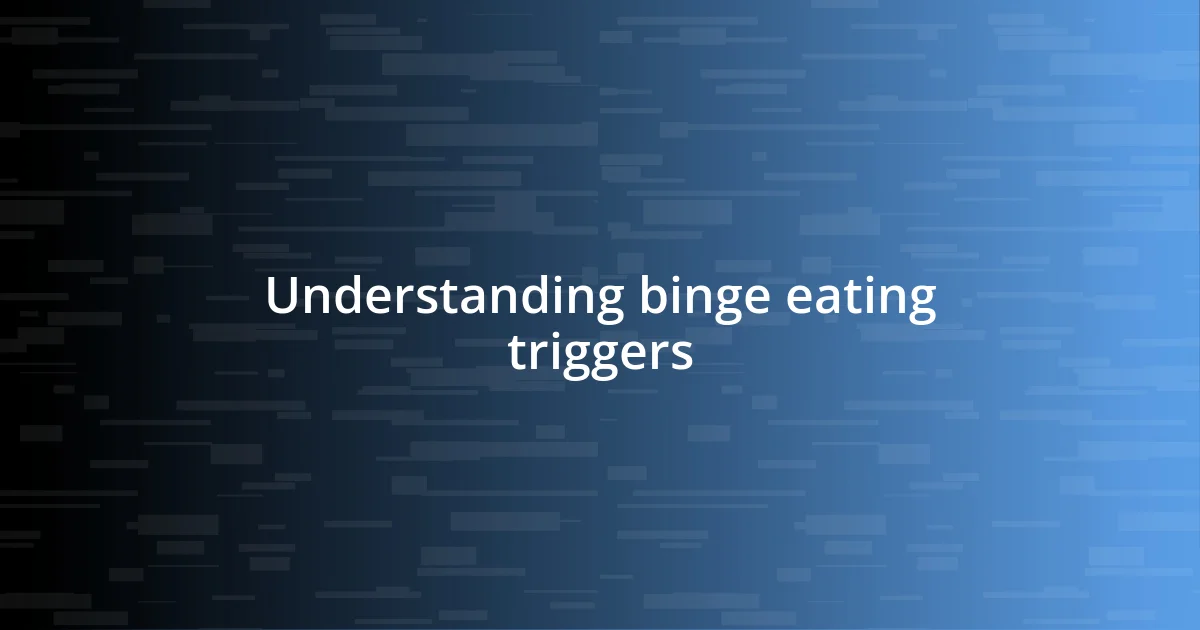
Understanding binge eating triggers
Binge eating triggers can often be deeply personal and varied, reflecting not just hunger but emotional states as well. I remember a time when stress from work flooded my mind, and before I knew it, I was standing in front of the fridge, devouring leftovers mindlessly. Can you relate? It’s as if food becomes a comforting distraction from an overwhelming feeling that demands attention.
One key trigger I’ve noticed is loneliness; those evenings when social engagements dwindle often led to restless snacking. When I reflect on those moments, I can still feel that emptiness, compounded by the regret that follows. It begs the question: why do we turn to food in times of emotional need instead of other forms of support?
Another common trigger is boredom, which can sneak up on you unsuspecting. I’d sit on the couch without a plan, and suddenly, a routine bag of chips would seem like the perfect pass-time. It’s interesting, isn’t it? Realizing that sometimes it’s not about hunger but the need for stimulation or entertainment that drives consumption can be eye-opening. Fostering awareness of these triggers has really changed my approach to eating, turning it from a habit into a more intentional and mindful experience.
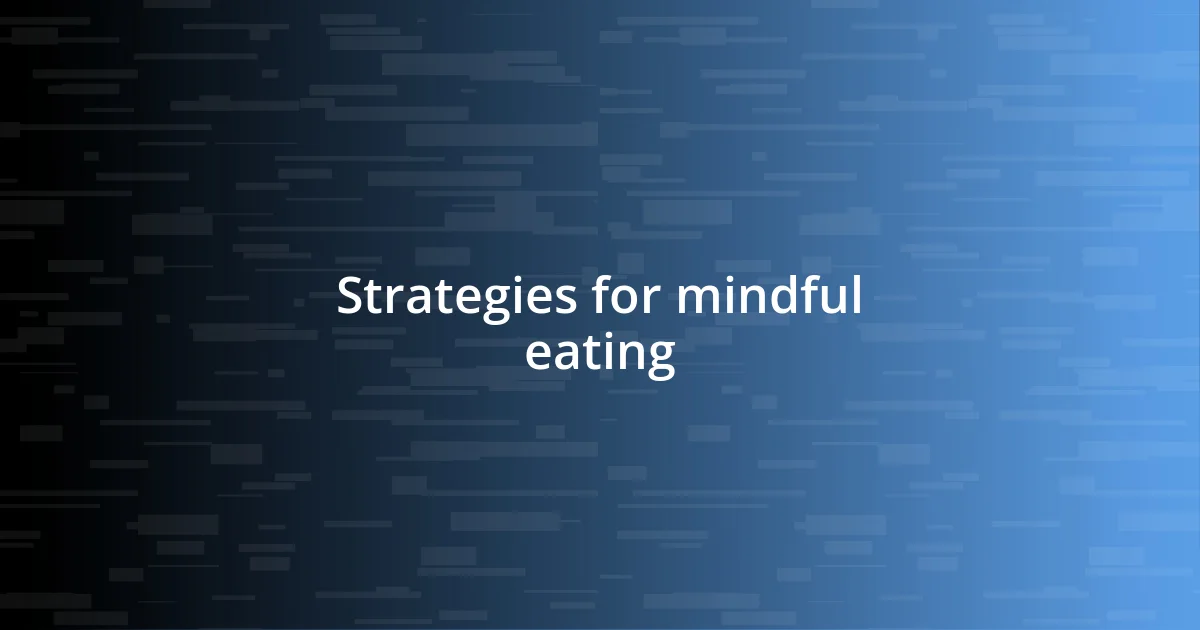
Strategies for mindful eating
To cultivate a mindful eating practice, I’ve found that slowing down is essential. When I take the time to appreciate each bite, the flavors and textures unfold in ways that I previously overlooked. There’s a certain joy in savoring my food, which transforms eating from a rushed task to a delightful ritual. I remember a cozy evening when I chose to prepare a simple salad; rather than shoveling it down, I relished every mouthful, and it turned into a profoundly satisfying experience.
- Set the Scene: Create a calm atmosphere while eating—dim lights or soft music can create a welcoming environment.
- Engage Your Senses: Focus on the colors, aromas, and flavors of your food. I often close my eyes for a moment before each bite to enhance the tasting experience.
- Limit Distractions: I try to avoid screens during meals, allowing me to fully concentrate on the food and acknowledge my hunger cues.
- Chew Slowly: Taking time to chew my food not only helps with digestion but also extends the enjoyment of eating. I aim for at least 20 chews per bite to really appreciate the textures.
- Reflect Post-Meal: I jot down how I felt during and after my meal. This practice keeps me aware of how certain foods satisfy or comfort me, helping me make better choices next time.
Incorporating these strategies has truly nurtured a more fulfilling relationship with food for me. It’s an ongoing journey, and each practice enhances not only my meals but also my emotional well-being.
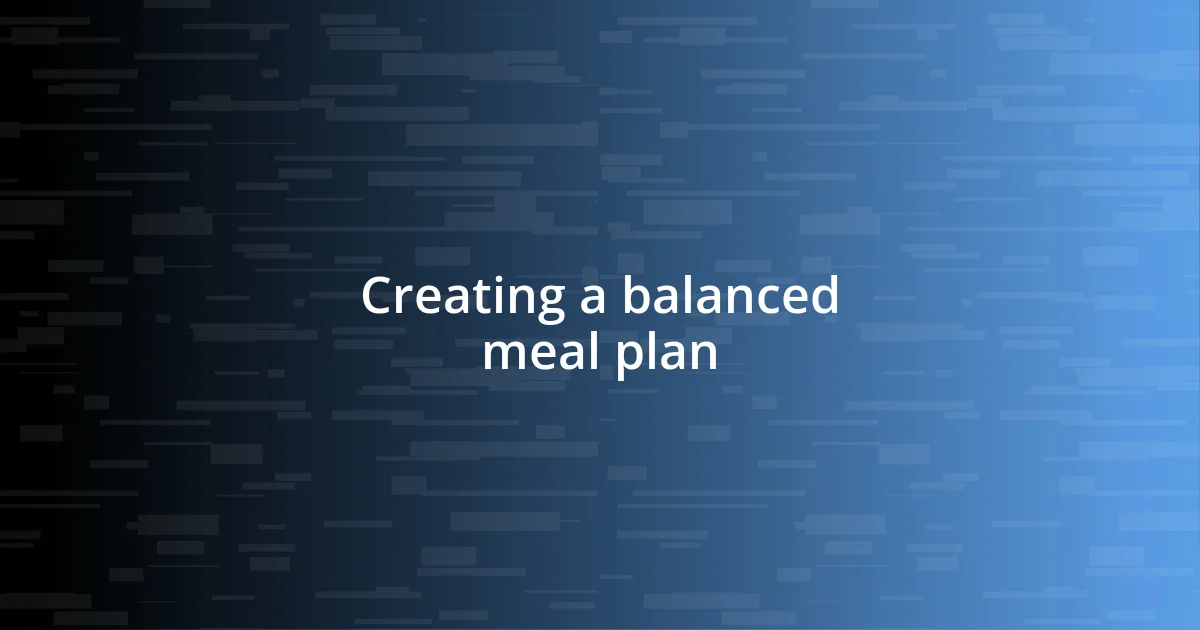
Creating a balanced meal plan
Creating a balanced meal plan can feel like a daunting task, especially when emotions come into play. From my experience, it’s about embracing variety and listening to what my body truly needs. For instance, I’ve found that incorporating colorful vegetables not only makes my plate visually appealing but also brings different nutrients to the table. I recall a summer when I tried adding a new vegetable each week. This simple act transformed my meals and made discovering new flavors exciting instead of overwhelming.
Another crucial aspect is meal timing. I used to skip breakfast, thinking I could compensate later, but that often led me to overindulge at lunch. Now, I focus on spreading balanced meals and snacks throughout the day. I typically plan for three main meals accompanied by two healthy snacks, ensuring I’m always fueled without reaching a point of excessive hunger. Have you ever noticed how hunger can cloud our judgment? It certainly did for me, and this shift led to a more compassionate approach to my body’s needs.
Ultimately, a balanced meal plan is about finding what resonates with you. For me, including protein and fiber in each meal keeps my cravings at bay and gives my meals lasting energy. I find that creating a weekly meal plan not only helps me save time but also reduces the temptation to binge eat. The clarity that comes from having a roadmap for my eating habits has made a world of difference in my journey.
| Food Group | Examples |
|---|---|
| Proteins | Chicken, tofu, lentils |
| Whole Grains | Brown rice, quinoa, whole-wheat bread |
| Fruits & Vegetables | Spinach, berries, carrots |
| Healthy Fats | Avocado, nuts, olive oil |
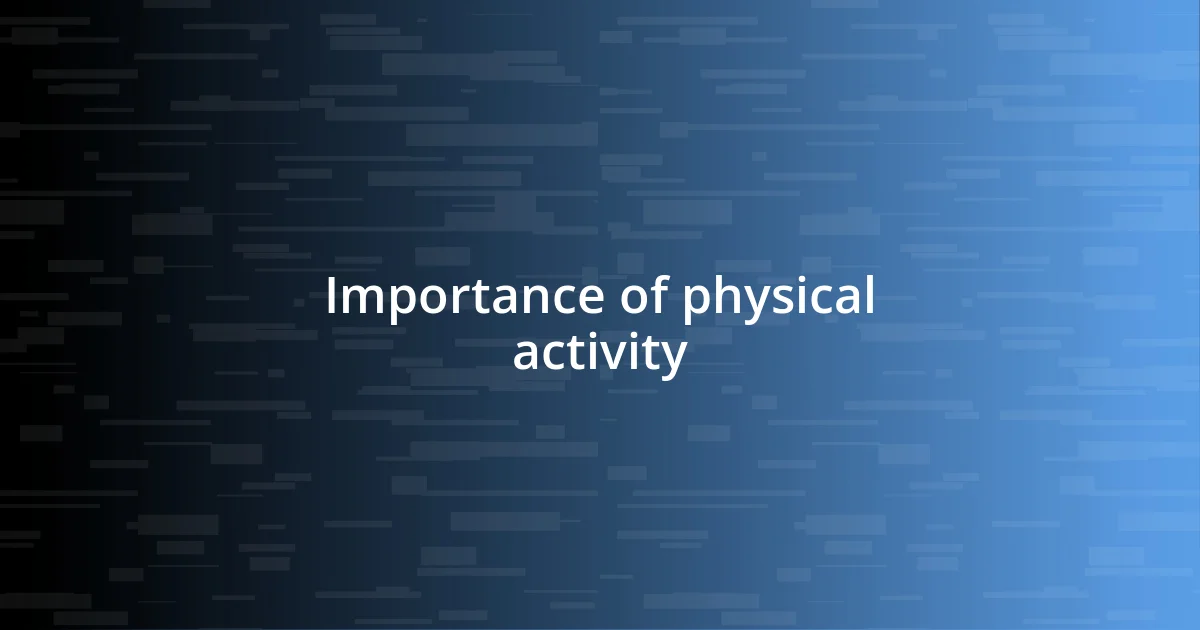
Importance of physical activity
I’ve come to realize just how vital physical activity is in my journey to overcome binge eating. Engaging in regular exercise helps me release pent-up emotions, which often serve as triggers for my binge behaviors. On days I feel particularly overwhelmed, a brisk walk or a rejuvenating yoga session can shift my mood dramatically, leaving me more centered and in control. Isn’t it fascinating how movement can change our emotional landscape?
When I think about my connection with exercise, I remember a time when I challenged myself to try different activities. From swimming laps to trying my hand at dancing, each new experience brought joy and a sense of achievement. These moments not only distracted me from cravings but also fostered a deep appreciation for my body’s capabilities. Have you ever felt that exhilarating rush after a good workout? It’s a reminder that our bodies are designed for movement, not just for coping with food.
I’ve also noticed that physical activity enhances my awareness of hunger and fullness cues. On days when I’m active, I find it easier to distinguish between emotional hunger and physical hunger. After a satisfying workout, I feel more connected to my body and better equipped to make mindful food choices. This profound connection reinforces the idea that nurturing my body with movement is just as important as nourishing it with food.
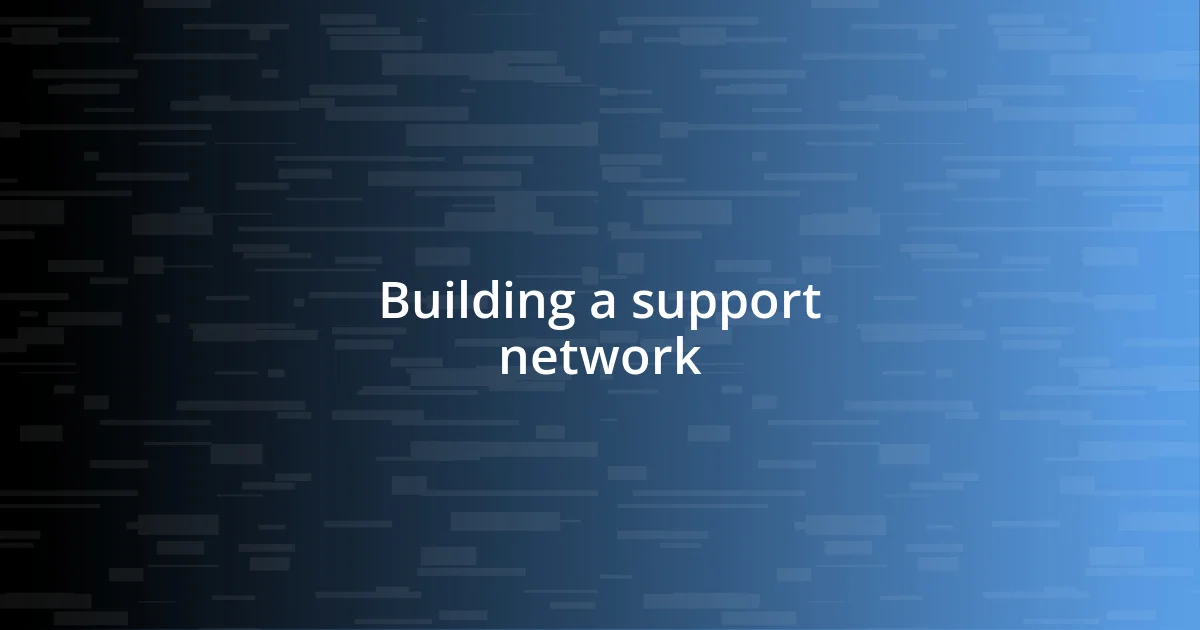
Building a support network
Building a support network is essential in overcoming binge eating; having people who understand your struggle can make a huge difference. I remember feeling so isolated in my journey, but once I began sharing my experiences with close friends, I realized how many of them were willing to listen and support me. It’s comforting to have someone to call during those tough moments, isn’t it? That connection turned out to be a lifeline.
Joining a support group opened a whole new world for me, one filled with shared experiences and mutual encouragement. I vividly recall my first meeting—everyone sitting in a circle, sharing their highs and lows, creating an atmosphere that felt safe and empowering. Knowing I wasn’t alone in my feelings gave me renewed strength; hearing others’ stories was both eye-opening and motivating. Have you ever found solace in sharing your struggles with others? It’s amazing how speaking out can lighten the load.
Additionally, I learned the value of having accountability partners. Just last month, I teamed up with a friend who also wanted to foster healthier eating habits. We check in with each other daily, sharing our triumphs and setbacks. This daily dialogue keeps me focused and helps prevent those spirals toward binge eating. When you have someone rooting for you, it becomes easier to stay committed to your goals, doesn’t it? Building this network of support has truly transformed my journey for the better.
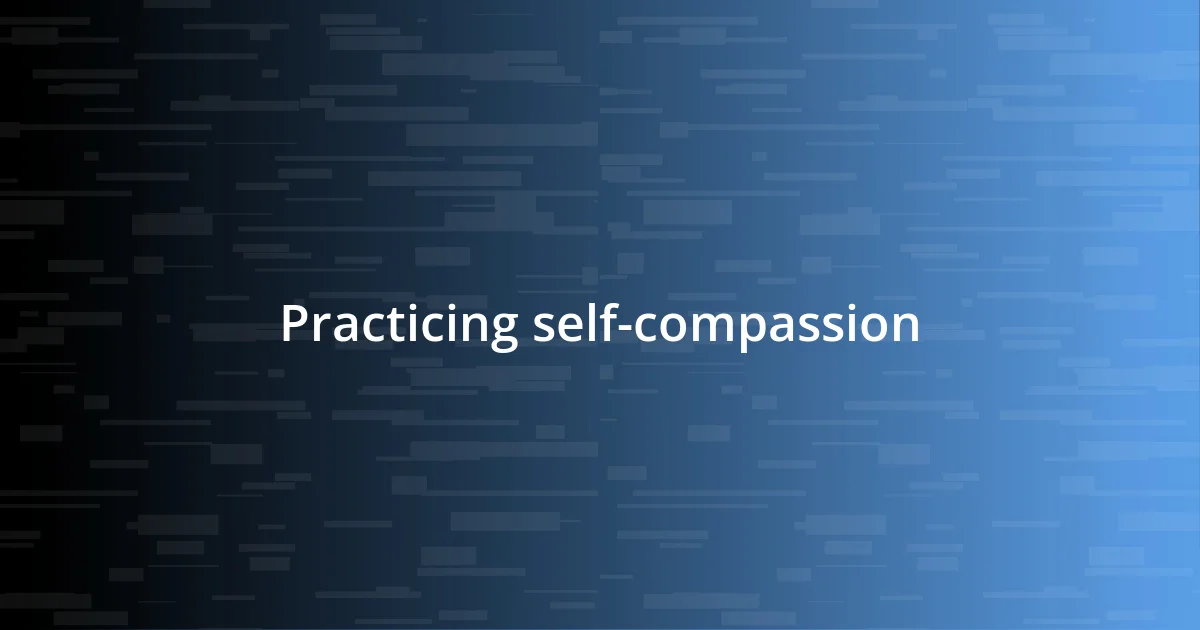
Practicing self-compassion
Practicing self-compassion has been a game changer in my battle against binge eating. There were moments when I felt utterly defeated after an episode, but learning to speak kindly to myself made all the difference. Instead of spiraling into self-loathing, I asked myself, “What would I say to a friend in this situation?” This shift in perspective allowed me to treat myself with the same care and understanding I would offer someone I love. It’s empowering, don’t you think, to realize that we can be our own support system?
I recall a particularly challenging night when cravings hit hard, and I binged despite my best intentions. I sat there feeling like a failure, but then I halted that negative self-talk. I took a deep breath and reminded myself that it’s okay to stumble—it’s part of being human. In that moment, I practiced self-forgiveness, allowing emotions to wash over me without judgment. That experience reinforced my belief that compassion is not just a feeling; it’s a practice we can cultivate to help heal from our struggles.
What’s fascinating about self-compassion is how it creates a safe space for growth. Every time I embrace my imperfections, I feel more resilient and less ashamed. I’ve learned to approach my eating habits not with harsh criticism, but with curiosity. Instead of asking, “Why did I do that?” I now ask, “What was I feeling at that moment?” This gentle inquiry has opened my eyes to deeper emotional patterns, making it easier to navigate my journey with grace and understanding. Isn’t it liberating to know that we can grow through kindness rather than pressure?
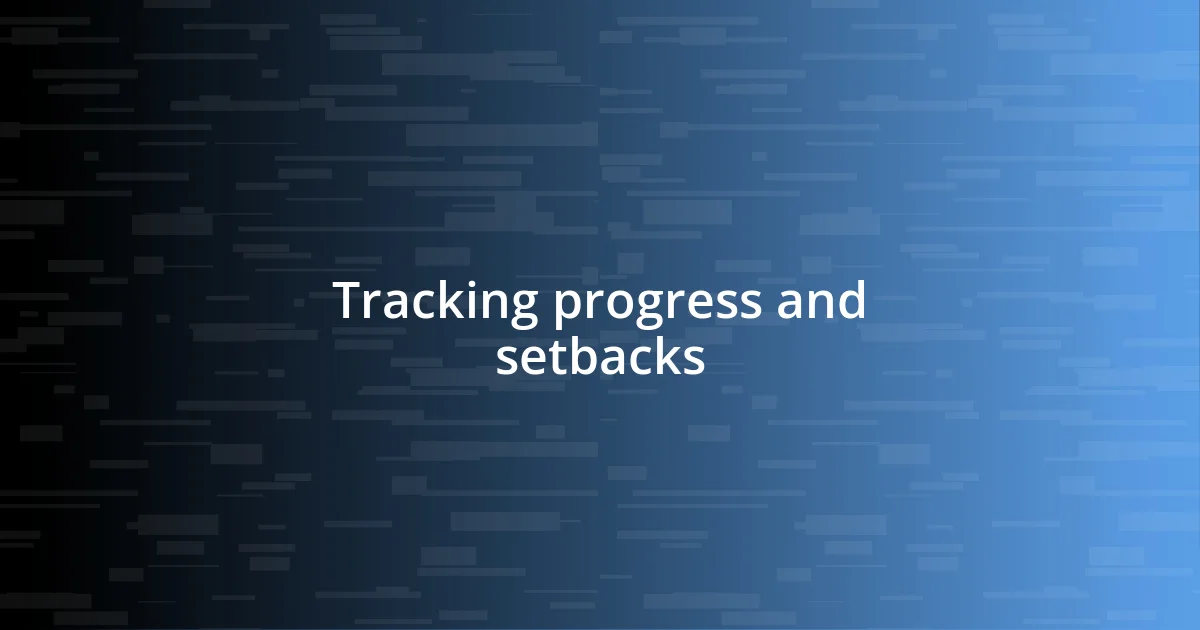
Tracking progress and setbacks
Tracking progress and setbacks can feel like a double-edged sword in the journey of overcoming binge eating. I remember my early days of writing in a journal, noting every meal and emotion that accompanied it. Some days felt like victories, while others felt discouraging. Reflecting on both has shown me how essential it is to acknowledge my progress, no matter how small. Have you ever noticed how documenting your journey can clarify your patterns and feelings?
One tool that transformed my approach was an app for tracking my mood and eating habits. Initially, I was skeptical—wouldn’t it just highlight my failures? Surprisingly, it became a source of insight. I began to see trends: when I had days full of stress or sadness, there were often corresponding binge episodes. Recognizing this helped me to better anticipate these moments and develop healthier coping strategies. The act of tracking was no longer just reporting on what went wrong; it became a platform for understanding myself more deeply.
Setbacks can sting, but I found that they didn’t define my journey. Instead, I started to view them as opportunities to learn. A few weeks ago, I faced a particularly tough week filled with emotional turmoil, and I slipped a few times. Instead of beating myself up, I revisited my journal and reflected on what triggered my behavior. It was enlightening! I realized that acknowledging the setback paved the way for growth. It’s fascinating to see how tracking can serve as a guide—allowing you to navigate those rough waters rather than feeling lost at sea, don’t you think?














